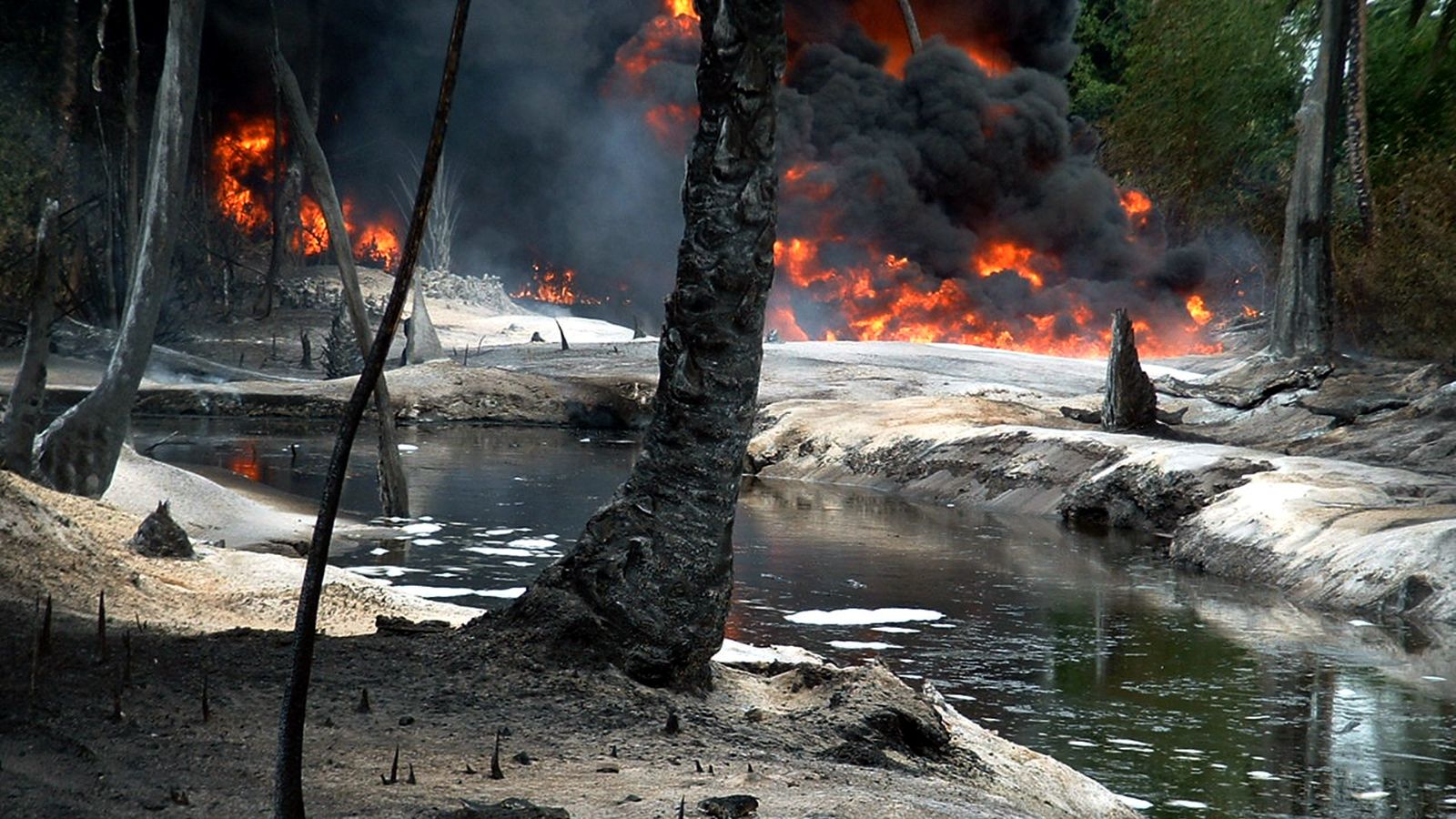Scientist Rebellion: Global Justice
This is the third of a series of blog posts that I am writing during the Global Scientist Rebellion, March 25th-28th 2021
Climate Injustice
Many British corporations owe great climate debts to the world. They have profited greatly under the current financial assumption that the cost of releasing CO2 into the atmosphere is £0.00. They make no apologies for their past colonialism, or current ongoing exploitation of nature and people in the global south.
BP use tactics of terror to protect their destructive processes, and have overseen the execution of indigenous communities1. Over recent decades half a million West Papuans have been murdered by Indonesian military, working on behalf of companies including BP2.

Oil from a leaking pipeline burns in the Niger Delta - source: Sky News
For years Shell failed to cleanup cancer causing chemicals in the Niger delta. Osai Ojigho, Amnesty International Nigeria described the event:
The discovery of oil in Ogoniland has brought huge suffering for its people. Over many years we have documented how Shell has failed to clean up contamination from spills and it’s a scandal that this has not yet happened. The pollution is leading to serious human rights impacts – on people’s health and ability to access food and clean water. Shell must not get away with this - we will continue to fight until every last trace of oil is removed from Ogoniland.
But these companies maintain a social contract to operate, by sponsoring cultural and sports events. They run greenwashing campaigns filled with futuristic tech, solar panels, and young people, distracting us from their ecocide and murder3.
Reparations - A moral obligation and a climate solution
For years fossil fuel companies have delayed the green transition, funding climate denial. More recently we have seen them engage in different discourses of delay, making empty promises of going net-zero whilst projecting increased oil extraction in the future.
These corporations must be made to pay for their actions - they won’t do it by themselves. We should target the banks who finance them too, and governments in Europe and America who have primarily benefited from these practices.
Reparations mean that countries in the global south will see colonial era debts written off, and instead the wealth the west has long taken by force can be paid back through investment into healthcare, education, sustainable agriculture, and a complete green industrial revolution.
A policy implementing some of these ideas was pledged by Shadow Chancellor John McDonnel in 2019, such that the UK would recognise Britain’s history of colonialism and massively disproportionate historic emissions, and provide free or cheap access to green technologies, supposing a green industrial revolution.
A Fourth Demand
Writing on the Scientist Rebellion, I have so far chosen themes: Tell the Truth, and Act Now. These are two of the three demands4 held by Extinction Rebellion since its inception.
Following two weeks of “International Rebellion” in October 2019, Sam Knights, a key organiser for Extinction Rebellion wrote a fantastic critique of XR, on the movement’s goals, communication, and failure to address racism and the movement’s lack of diversity. If you haven’t already, read it now!5
Since 2019 the movement has undeniably evolved. Some groups have added a fourth global justice demand, for example Extinction Rebellion US6:
We demand a just transition that prioritizes the most vulnerable people and indigenous sovereignty; establishes reparations and remediation led by and for Black people, Indigenous people, people of color and poor communities for years of environmental injustice, establishes legal rights for ecosystems to thrive and regenerate in perpetuity, and repairs the effects of ongoing ecocide to prevent extinction of human and all species, in order to maintain a livable, just planet for all.
This demand would make a great addition to all XR groups’ demand lists, making it clear that the climate crisis cannot be solved without making global justice part of the solution.
Activists must support climate movements in other countries, recognising the struggles faced by indigenous communities on the front line of climate activisms. We must question why our own tactics can lead to exclusion, and combat this in our overall strategy.
This advice applies not just to XR, but to all climate groups, and to Scientist Rebellion. Whilst we are proud of a diverse gender and LGBT+ inclusion, our movement is not representative of different global communities. We must do more to overcome our own barriers, reaching out to scientists, academics, activists and communities around the world, so that our aims and approach reflect a diverse collective and not just a privileged few.
There is no climate justice without global justice.
https://www.thecanary.co/global/world-analysis/2018/11/09/bp-accused-of-causing-a-slow-motion-genocide-in-one-of-the-worlds-poorest-regions ↩︎
https://ecohustler.com/nature/bp-accused-of-west-papua-chain-saw-massacre ↩︎
https://sam-j-knights.medium.com/extinction-rebellion-we-need-to-talk-about-the-future-95459aa4d4e0 ↩︎
